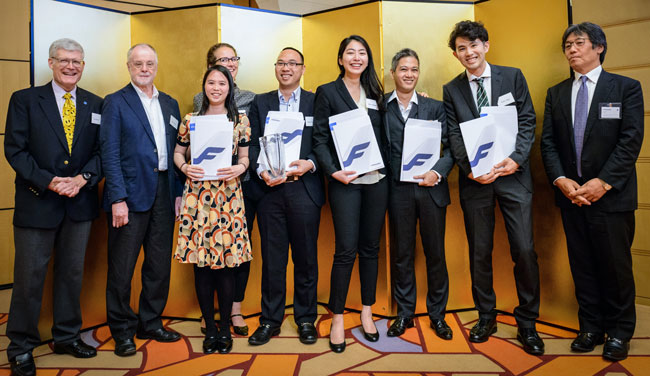
Team Kokorozashi, who won first prize.
On 7 June, the 23rd Japan Market Expansion Competition (JMEC) came to its conclusion, representing another year in which talented young people have been able to hone and expand their skills under the guidance of senior figures in the Tokyo business community.
“We’re here tonight to celebrate the success of our 65 JMEC Participants”, JMEC Executive Committee Chairman Tom Whitson told those attending the event at the Tokyo American Club. “You join an alumni group of over 1,152 who have successfully completed the JMEC programme”.
The programme is designed to encourage entrants to work in teams to build their executive skills, while simultaneously assisting foreign firms—called Project Clients—by developing a high-quality business plan tailored to the Japanese market.
Whitson also recognised the years of dedication of one member in particular. “We want to recognise Mitsuhiro Honda who has retired from Hewlett Packard, and thank him for his support for JMEC for so many years,” Whitson said.
The competition was founded by the Australian and New Zealand Chamber of Commerce in Japan in 1993, and is supported by 18 foreign chambers of commerce, including the British Chamber of Commerce in Japan (BCCJ).
Participants took two months of lectures, more often than not on topics that were entirely new to them. The remaining five months were spent applying this knowledge to writing business plans.
“They’ve given up a lot during the last seven months: social life, family, friends, sleep, but I would hope that they would all say that the learning experience and the camaraderie has been worth the effort and the sacrifice”, Whitson said. “We expect that your JMEC training is going to expand your future opportunities, and we really hope your employers appreciate and value your JMEC experience”.
With guidance from a mentor and a business consultant, the plan covered business strategy, marketing, distribution, finance, organisation, human resources and legal issues. Mentors and consultants from BCCJ member firms, including PwC, Ogilvy & Mather and Bloomberg, were among those offering their expertise.
Judges: hard task
Betsy Rogers, JMEC assistant programme director, introduced this year’s judges, emphasising the momentous task they had faced. “Our judges give up not just two whole days, but they have two weeks to read 13 business plans that are no less than 50 pages on 13 different industries”.
Judge Rike Wootten highlighted how close the appraisal of the winning teams had been.
“I’ve been doing this for 12 years, and this is the most plans we have ever had,” he said. “The top three were within 2.5% of each other—the oral presentation was the key factor in deciding the outcome”.
On average, 1,071 hours were spent on the plan by each team, and 200 hours by each Participant. Among the awards presented were one each for best presentation, best fighting spirit, and for thinking outside of the box.
And the winners are …
Team Kokorozashi won first prize with the business plan devised for a new personalised nutrition project to be conducted by Royal DSM, a global science-based Dutch firm active in the areas of health, nutrition and materials.
Awarded second prize was Team Spectacular’s market entry plan for DOCOsoft, an insurance and financial services firm that has a strong presence in the UK.
Team Saber took third prize with a business plan for the Swedish Chamber of Commerce in Japan.
Whitson praised the teams for their hard work: “You showed dedication and creativity to provide your project clients with tailored business plans addressing their objectives in the Japanese business market”.
Put into practice
BCCJ ACUMEN spoke with Rieko Whitfield, part of the winning team and a graduate of Central Saint Martins, the University of Arts London. “I’m speechless right now, and really proud of my team”, she said.
Talking about the benefits of the programme, Whitfield explained that, “I wanted to have the skills and tools to be able to back my ideas, and make a business case out of it.
“Now I have more confidence. If there is an idea I want to put into practice, or make something into reality, I have more confidence to back my ideas and not let my own self-doubt hold me back. Even if you’re not an expert, it doesn’t mean that your ideas aren’t valid”.
The JMEC 24 programme starts in August 2017 with information sessions for potential participants, and is attended by JMEC alumni and staff.






